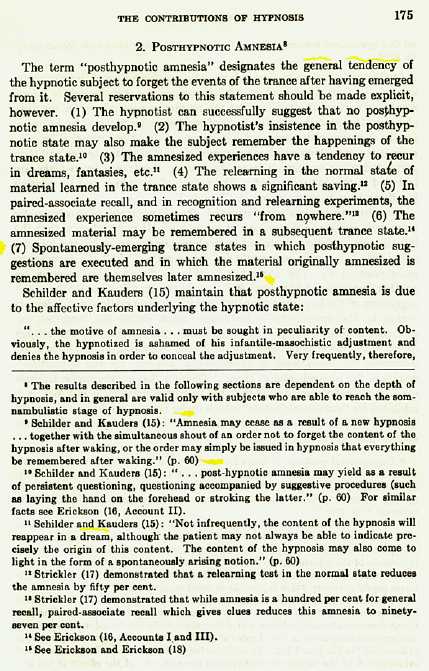EMOTIONS AND MEMORY
Page 175, concerning dissociation or repression from childhood.
Conclusion, page 175
At the top of page 175. "The general tendency" of the subject to forget the events of the trance after emerging from it. (1) states that suggestion conducive to remembering is successful. If this is so it is reasonable to assume the reverse to be easier and more successful because of the "tendency to forget". The implications of; (2) reversed as well of (4) with regard to cognitive reinforcements creating severe distortions and the consideration of multiple subjects, given conditional, reciprocal suggestion motivated by disassociation's or repressed parental complex, fears or desires and phylogenically driven affectations; can be extreme in memory control as well as action.
Consistently post hypnotic controlled memory or action, elements of behavior, are shown as easily attainable when instinctual needs parallel to survival or evolution are invoked that are phylogenically correct. in addition the extreme becomes moreso in potential with consideration to memory and post hypnotic action over long periods of time enabling drastic repression's, dissociation's, cognitive distortions and reflex conditioning.
SEE INFERENCE ONE BELOW.
The implications of; (2) reversed as well of (4) with regard to cognitive reinforcements creating severe distortions and the consideration of multiple subjects, given conditional, reciprocal suggestion motivated by disassociation's or repressed parental complex, fears or desires and phylogenically driven affectations; can be extreme in memory control as well as action.
Consistently post hypnotic controlled memory or action, elements of behavior, are shown as easily attainable when instinctual needs parallel to survival or evolution are invoked that are phylogenically correct. in addition the extreme becomes moreso in potential with consideration to memory and post hypnotic action over long periods of time enabling drastic repression's, disassociation's, cognitive distortions and reflex conditioning.

INFERENCE ONE
Relating potentials for hypnotic performance to results of research, practice and experiments of hypnosis. Christopher A. Brown 8/17/01
BASIS 1 of INFERENCE
The first sentance of page 175 of EMOTIONS and MEMORY, 1964, by David Rappaport,
"The general tendency" of the subject to forget the events of the trance after emerging from it."
BASIS 2 of INFERENCE
(1) of the same paragraph states that, "The hypnotist can successfully suggest that no posthypnotic amnesia develop".
Basis 2 Restated; Suggestion conducive to remembering is successful or generally, suggestion effecting memory has effect against a general tendancy.
CONDITIONS OF BASIS
The first note page 175, EMOTIONS and MEMORY, Note #8 states (first note below main text) that the results of memory described "in general are valid only with subjects who are able to reach the somanmbulistic stages ofhypnosis."
INFERENCE ONE
Logical inference of BASIS 1 with BASIS 2, is that; suggestion to forget will have a greater effect on memory because of the general "tendency to forget". Research confirms with observations of behavior consistent with general hyperamnesia at the top of page 176, the end of a footnote that begins on page 175 stating;
"we find hypnotized people indignantly denying they have been hypnotized."
INFERENCE ONE
If the tendancy is to forget following hypnosis that induces a trance to the level of somanmbulism and suggection effecting memory is successful then suggestion to forget will be more effective than suggestion to remember.
.
Another general perspective.
What is the correct answer to this question?
Q.What is easier to do than forgetting?
A. I don't remember.
Page 176, Contributions of Hypnosis
